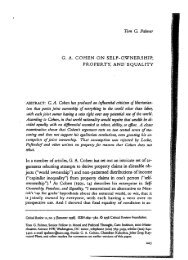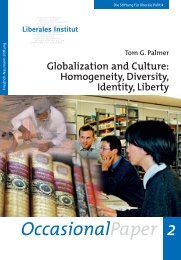Are Patents and Copyrights Morally Justified? - Tom G. Palmer
Are Patents and Copyrights Morally Justified? - Tom G. Palmer
Are Patents and Copyrights Morally Justified? - Tom G. Palmer
Create successful ePaper yourself
Turn your PDF publications into a flip-book with our unique Google optimized e-Paper software.
No. 3] <strong>Are</strong> <strong>Patents</strong> <strong>and</strong> <strong>Copyrights</strong> <strong>Morally</strong>Jvstifi~d7 823<br />
ideas arejust as much property as tangibleobjects. Ifideas preexist<br />
in nature <strong>and</strong> are merely discovered (as, for example, scientific<br />
principles ornaturally occurring substances),’ 7 then “he<br />
who does discover, or first takes possession of, an idea, thereby<br />
becomes its lawful <strong>and</strong> rightful proprietor; on the same principle<br />
that he, who first takes possession ofany material production<br />
ofnature, thereby makes himself its rightful owner.” 18 On<br />
the other h<strong>and</strong>, if ideas are not pre-existing in nature, but are<br />
the products of an active intellect, then “the right of property<br />
in them belongs to him, whose labor created them.” 9<br />
Spooner spends the rest ofthe book defending his argument<br />
against objections. Against the objection that ideas are incorporeal,<br />
he argues that other incorporeal entities can also be objects<br />
ofproperty rights, such as labor, a ride, one’s reputation<br />
<strong>and</strong> credit; even the right to property is itself, inalienableproperty.<br />
To the objection that property rights in ideas cease on<br />
publication or communication of an idea to another (“because<br />
that other person thereby acquires as complete possession of<br />
the idea, as the original proprietor” 20 ), Spooner responds that<br />
it falsely assumes that “if a man once intrust his property in<br />
another man’s keeping, he therebyloses his own right ofproperty<br />
in it,” 2 ’ Possession is not equivalent to the right ofuse, for<br />
“where one man intrusts his property in another man’s possession,<br />
the latter has no right whatever to use it, otherwise than<br />
as the owner consents that he may use it.” 22<br />
Against the objection that some ideas are social in nature,<br />
Spooner argues that the role of society in the production of<br />
ideas is nil, Ideas are created by individuals, <strong>and</strong> only individuals<br />
have rights to them. As Spooner counters, “Nothing is, by<br />
its own essence <strong>and</strong> nature, more perfectly susceptible ofexclusive<br />
appropriation, than a thought. It originates in the mind of<br />
des merelyas tools... .There is, therefore, no such thing as the physical labor<br />
of men, independently of their intellectual labor.<br />
Id. 17. See Spooner, supra note 2, at 10.<br />
18. Sd. at 26. Note that this would go farbeyond thetraditional scope of the patent<br />
laws ofthe United States, whichexplicitly exclude discoveries ofscientificor mathematical<br />
laws or of naturally occurring substances from patent protection. Recently, however,<br />
the U.S. Patent Office has been awarding patents to discovers of useful<br />
mathematical algorithms, a trend that would surely have pleased Spooner.<br />
19. Id. at 27.<br />
20. Id. at 42 (emphasis in original).<br />
21. Id.<br />
22. Id. at 52.











